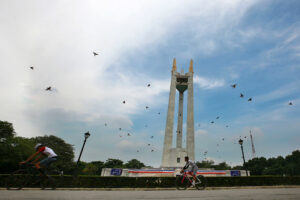By Justine Irish D. Tabile, Reporter
THE QUEZON CITY government is looking to boost tax incentives for businesses that will invest in key priority sectors.
“Quezon City is enhancing its business environment through strategic policy reforms and infrastructure development aimed at medium and large businesses,” said Quezon City Mayor Maria Josefina “Joy” G. Belmonte-Alimurung at the Metro Manila Business Conference on Thursday.
“We are in the process of amending the Quezon City Incentives Code to align with the Board of Investments’ (BoI) Strategic Investment Priority Plan (SIPP),” she added.
The updated code, which is also aligned with the United Nations’ sustainable development goals and the National Economic and Development Authority’s Ambisyon Natin 2040 objectives, “aims to reduce business costs, streamline processes, and foster partnerships.”
“It will provide newly constructed buildings with a two-year exemption on business tax, amusement tax, franchise tax, and real property tax,” Ms. Belmonte-Alimurung said.
“Meanwhile, businesses participating in our city’s investment priorities plan will receive a three-year exemption on all of these taxes,” she added.
Margie S. Mejia, head of the Quezon City Business Permits and Licensing Department, said that the amendments to the QC Incentives Code aim to reflect the current business environment.
“The old Incentives Code was passed between 10 and 15 years ago, so we need it to be attuned to the times,” Ms. Mejia said in a panel discussion.
“The target of the updated code is medium and large enterprises with the hopes of inviting them to establish themselves in Quezon City,” she added.
Ms. Mejia said businesses in Quezon City could tap its big population, which is estimated by the Philippine Statistics Authority at around 2.96 million as of May 1, 2020.
According to the World Population Review, Quezon City’s population may have gone up to 3.28 million in 2024.
BoI Investment Assistance Service and One-Stop Action Center for Strategic Investments Director Ernie Delos Reyes said that the Quezon City Local Economic Investment Promotions Office (LEIPO) is already reviewing the amendments to the Incentives Code.
“The focus is on strategic investments, but in relation to business and real property tax, we provided inputs on how they can be competitive with other local government units,” Mr. Delos Reyes said in a Viber message.
“We also told them about non-fiscal incentives like effective and efficient investment facilitation and alignment of its policies with national policies, especially the latest economic reforms,” he added.
Mr. Delos Reyes said that national incentives are already a standard under the Corporate Recovery and Tax Incentives for Enterprises law.
On April 18, the Quezon City LEIPO conducted a public consultation for the new Quezon City Incentives Code, which is meant “to cultivate a conducive business environment, stimulate investment inflow, and foster sustainable economic growth.”
Under the Quezon City Economic Development Incentives Code of 2013, qualified medium and large enterprises are entitled to a tax holiday on real property and exemption from franchise tax and amusement taxes for four years, among others.
Data from the Department of Trade and Industry showed that there are 129,477 business name registrations in the National Capital Region.
Most of these were wholesale and retail trade, food and beverage service activities, transportation and storage, real estate activities, and other service activities.
